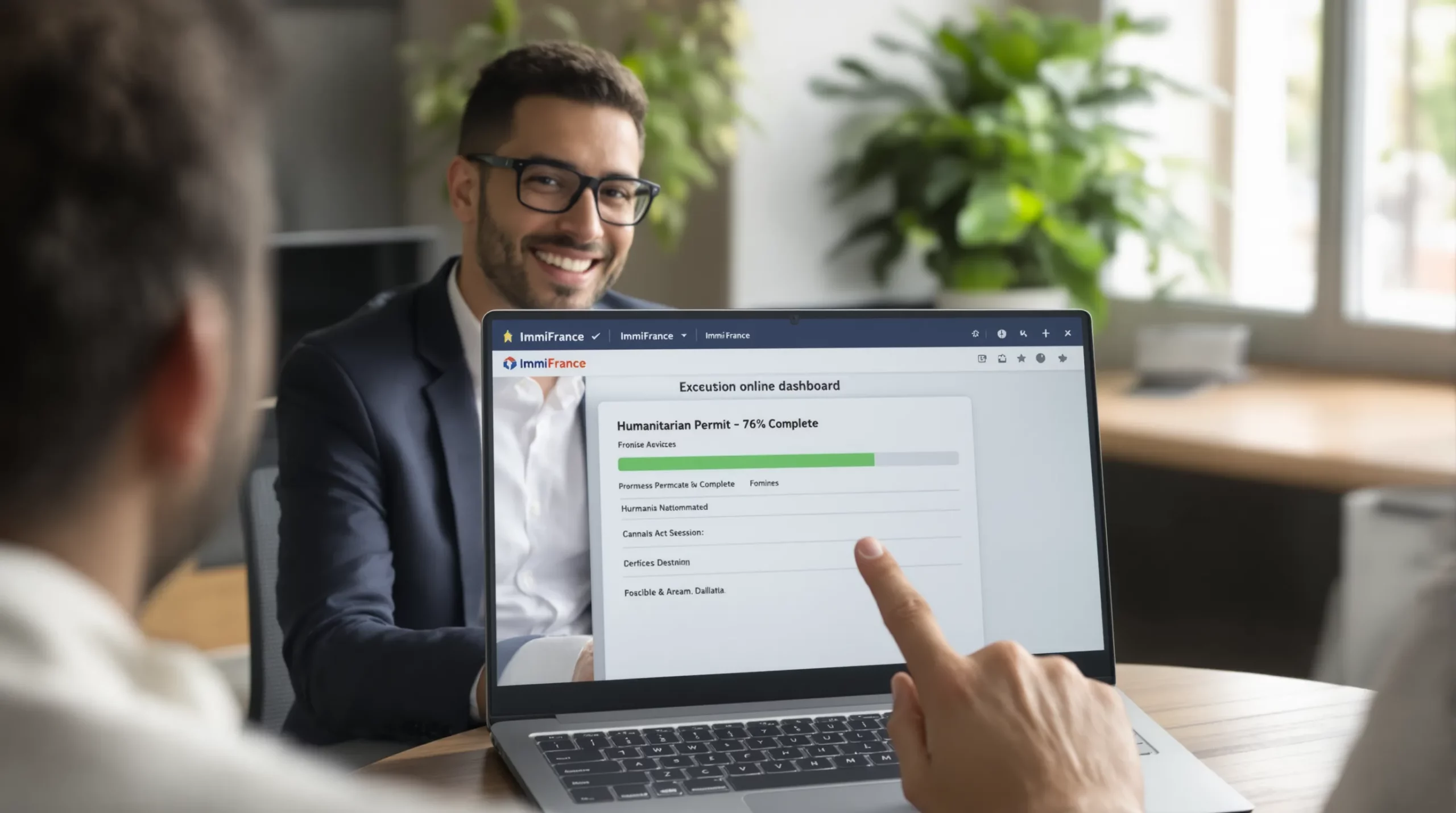Getting a Humanitarian Residence Permit: Criteria and Success Stories

Obtaining a residence permit on humanitarian grounds can feel like the last lifeline when every other immigration door seems closed. Yet French law does provide a legal framework that allows prefectures to grant a “titre de séjour pour raisons humanitaires” to people facing exceptional hardship. Understanding the criteria, preparing the right evidence, and learning from real-world successes dramatically improves your odds of approval.
1. What Is a Humanitarian Residence Permit?
Under Article L.435-5 of the Code de l’entrée et du séjour des étrangers et du droit d’asile (CESEDA), the préfet may issue a one-year renewable residence permit when an applicant proves « des motifs humanitaires ou des considérations exceptionnelles ». Prefectures use this discretionary power for situations that fall outside the standard permit categories, such as:
- Threats to life or safety in the country of origin that do not meet the strict refugee definition.
- Situations of grave social vulnerability or exploitation in France.
- Medical conditions that do not qualify for the separate “étranger malade” permit but still require continuity of care.
- Victims of violent crime, trafficking, or domestic abuse whose circumstances are atypical.
The permit is either issued as a standalone carte de séjour “humanitaire” or, more commonly since 2024, as a carte “vie privée et familiale” (VPF) with the humanitarian ground mentioned in the prefectural notes.
Good to know: Because the decision is discretionary, prefectures expect a compelling, well-documented dossier. Legal arguments and human narratives must align.
2. Key Eligibility Criteria in 2025
| Criterion | What the Prefecture Examines | Typical Supporting Evidence |
|---|---|---|
| Serious threat or persecution in home country (non-asylum) | Credibility of threat, impossibility of internal relocation | Police reports, NGO statements, photos, news articles, sworn affidavits |
| Extreme social vulnerability in France | Lack of shelter, single parenthood, disability, social services follow-up | Social worker reports, CAF or RSA refusals, attestations from shelters |
| Medical grounds below the “étranger malade” threshold | Need for ongoing treatment, impact of interruption | Doctor’s certificate (médecin de l’ARS), hospital letters, treatment plan & costs |
| Victim of trafficking or domestic violence | Ongoing cooperation with authorities, risk of reprisals | Police complaints, protection orders, NGO certificates, psychological reports |
| Proven integration efforts | Time in France, language, schooling of children, tax filing | Francisation certificates, pay slips, tax returns, school attendance letters |
A single dossier may combine several criteria. For example, an undocumented parent with a chronically ill French-born child can highlight both humanitarian (child’s health) and family-life aspects.

3. Step-by-Step Application Roadmap
- Document screening and legal triage
Identify which humanitarian angles are strongest. At ImmiFrance we start with a 30-minute phone assessment and an evidence checklist. - Collect core civil documents
Passport (even if expired), birth certificate + certified translation, proof of address less than 3 months old. If your passport is held by police or an employer, obtain a declaration of loss or theft. - Compile humanitarian evidence
Medical certificates, police complaints, social-worker reports, school attestations, integration certificates. Prioritise dated documents on headed paper. - Draft a personal statement (lettre de motivation)
Two pages maximum, chronological, calm tone, referencing attachments (“Annexe 1: rapport psychologique”). - Optional legal brief
Short memo citing CESEDA articles, ECHR case-law, or Conseil d’État precedents (e.g., CE, 18 Jan 2023, n° 451234) to show the prefecture’s margin of appreciation isn’t unlimited. - Book the appointment
Many prefectures require an ANEF pre-registration. If slots are blocked, send the dossier by registered mail (AR) to lock the filing date, then follow up weekly. - Attend the submission
Bring originals, photocopies, and a calm interpreter if needed. Pay the €50 timbre fiscal for file opening. - Récépissé and follow-up
You should receive a six-month récépissé. Monitor the online portal and answer any additional document requests within 15 days. - Decision and card collection
Average 2025 timeline: 4–6 months in Île-de-France, 2–3 months in smaller départements. Negative decisions can be appealed within two months.
Appeal Options If Refused
- Administrative appeal (recours gracieux) to the préfet.
- Hierarchical appeal to the Ministry of the Interior.
- Contentious appeal before the Administrative Court (Tribunal administratif) within two months (Article R421-1 CJA).
An urgent référé-suspension can halt removal while the court reviews the file.
Internal link idea: readers tackling an OQTF after a refusal can follow the advice in our guide OQTF Explained: Your Options to Contest an Obligation to Leave France.
4. Rights Granted by the Permit
- Legal residence for 12 months, renewable.
- Immediate right to work (no labour-market test required).
- Access to CPAM health coverage and potential CAF allowances. See Medical Coverage in France: Registering with CPAM as a New Visa Holder.
- Pathway to the 4-year multi-annual VPF card, then the 10-year long-term resident card after five years of stable stay.
- After five years of uninterrupted residency (or two years if rendering exceptional services to France), you may apply for naturalisation.
5. Common Pitfalls to Avoid
- Submitting vague medical letters (“needs follow-up”) without treatment plans or medication lists.
- Using undated NGO attestations—prefectures dismiss them as generic.
- Letting a récépissé expire without requesting renewal at least 15 days in advance.
- Waiting for the prefecture to call back instead of sending polite follow-up emails every three weeks.
6. Real-Life Success Stories
Case 1: Trafficking Survivor Regularised in Lyon
Profile: 26-year-old woman from Nigeria, forced into prostitution after entering Italy. Reached Lyon in 2022, filed police complaint, placed in a safe house run by NGO Amicale du Nid.
Challenge: She lacked a passport and had never filed for asylum, fearing reprisals from traffickers.
Strategy: ImmiFrance worked with her social worker to gather the police procès-verbal, medical certificates documenting PTSD, and integration evidence (French classes, volunteer work). The file highlighted Article 10 of Directive 2011/36/EU on trafficking victims.
Outcome: Prefecture issued a one-year VPF card “motif humanitaire” in March 2024. She now holds a CDI as a caregiver and is applying for a multi-annual card.
Case 2: Sick Child Triggered Family Permit in Lille
Profile: Algerian couple with two children; the youngest (4 years) suffers from cystic fibrosis. The family overstayed a tourist visa in 2021.
Challenge: The mother’s initial medical‐stay application was rejected because the child technically held a valid visa at entry.
Strategy: ImmiFrance argued humanitarian grounds, emphasising that Lille University Hospital provides a unique paediatric CF trial unavailable in Algeria. We annexed a detailed physician letter, treatment cost estimate, school integration proof, and €0 income tax declarations.
Outcome: Full family received VPF cards in July 2025 with the father’s work authorisation, allowing financial stability during ongoing treatment.
Case 3: Senior Without Passport Secured Status in Marseille
Profile: 68-year-old Armenian widower living with his naturalised daughter since 2015, suffering from severe diabetes complications.
Challenge: Embassy refused to renew his expired passport. No asylum claim pending.
Strategy: We built a humanitarian dossier highlighting social isolation and medical risk, plus the daughter’s sworn financial support. A notary drafted a procuration for prefecture formalities (see our guide Using Notaries to Authenticate Foreign Power of Attorney for Visa Files).
Outcome: Prefecture granted a one-year humanitarian card with a travel document (titre d’identité et de voyage) in April 2024.
7. How ImmiFrance Can Help
- Personalized eligibility assessment (free 15-minute call).
- Prefecture-specific document kits and appointment monitoring.
- Professional translations and certified copies.
- Lawyer referral for appeals and court representation.
- Secure client portal for real-time case tracking.

Frequently Asked Questions
Can I apply for a humanitarian permit if I already received an OQTF? Yes, but you must file an appeal or a new residence application simultaneously and request suspension of removal. Immediate legal advice is essential.
Do I need a valid passport? A passport strengthens the file, but prefectures may still accept the application if you prove an objective impossibility to obtain one (embassy refusal, conflict, statelessness).
Is the permit renewable? Generally yes, provided the humanitarian situation persists and you demonstrate continued integration (work contracts, tax filings, language courses).
What fees apply? €50 stamp when filing and €225 tax (€200 + €25 stamp) upon card issue. Victims of trafficking and domestic violence are exempt.
Need tailored guidance? Schedule a confidential case review with an ImmiFrance adviser today and turn your humanitarian grounds into a secure legal status.
